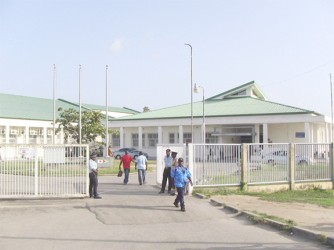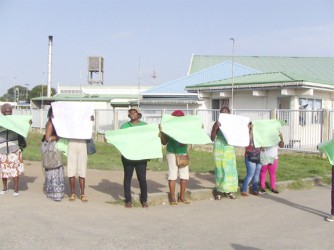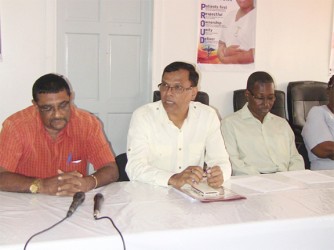After a food shortage at the New Amsterdam Hospital sparked a picketing exercise, regional officials yesterday said that the situation was blown out of proportion and accused opposition activists of trying to make the administration look bad.
The demonstration was also driven by reports that a female patient, who was admitted, went into diabetic shock as a result of not receiving meals and subsequently died. Chief Executive Officer of the Berbice Regional Health Authority (BRHA) Dr. Vishwa Mahadeo, however, refuted the reports, while noting that the patient was in a comatose state for more than two days and could not have eaten food. “She was having infusions and all the necessary medications intravenously,” he said at a news conference called yesterday to address the situation.
Human rights activists, concerned members of the public and APNU+AFC supporters, after confirming with staffers attached to the hospital’s kitchen that there was a shortage of food supplies, picketed the hospital on Wednesday, while demanding both the removal Mahadeo and the CEO of the hospital Allan Johnson.

The protestors accused the hospital’s administration of neglecting duties, while stating that they were spending too much time campaigning and not enough time providing the services taxpayers pay them to provide. One of the protestors, Maxine Williams, told Stabroek News she contacted the hospital’s administration upon hearing about the shortage of food supplies and was told that “there was no transportation to bring the goods from the Fort Canje Hospital across to New Amsterdam Hospital.” This was unacceptable, she stated, given the short distance between the two hospitals.

Williams explained that subsequently a wheelbarrow was provided to transport the food. “When it arrived in the kitchen, it was observed by the kitchen staff that there were rotting vegetables among the things given to cook,” she, however, said. The lack of food supplies coupled with the supply of rotten vegetables apparently frustrated the kitchen staff to the point where they refused to cook. Consequently, patients of the hospital were not supplied with meals on Tuesday or on Wednesday morning.
Williams said she knew the picketing exercise would be dismissed as “a political stunt” but emphasised that all the protestors want is for something to be done urgently. She stressed that protesting was the only way to receive immediate action from government. “We hope that the administration will come out of the TV studios and do their jobs. Stop campaigning and work. They prefer to campaign rather than provide the services they are being paid to provide,” she remarked.
Another protestor, who gave her name as ‘Pat,’ became very emotional while listing the many trials persons face when trying to receive medical attention at the hospital. “There is

no food in the hospital and we are not going to accept this today. Not everybody could afford to take food for their families in the hospital and the hospital is supposed to provide food. If they can’t find food, what are the people going to do?” she questioned.
‘Orchestrated’
Meanwhile, Mahadeo and Region Six Chairman David Armogan, who were unreachable on the day of the protest, held an emergency press conference yesterday in the boardroom of the BRHA to address the issues raised by the angry protestors.

Mahadeo admitted that there was a shortage of food supplies but noted the issue was blown out of proportion by anti-government supporters. He identified powdered milk as being one of the items in “short supply” and stated this was as a result of “supplier issues.” He further acknowledged that rotten vegetables were indeed supplied to the hospital’s kitchen but claimed it was due to a mix up—the bag with the rotten vegetables was set aside to be discarded but somehow ended up at the hospital anyway.
Coming to the defence of his region’s health department, Armogan said while there was in fact a shortage, it was not brought to the attention of the relevant authorities but rather to opposition elements, and thus persons could not have expected the matter to be addressed in a timely manner. “
Armogan said he started to look at the issue from a political angle and was led to believe that it “might have been an orchestrated attempt to embarrass the administration.” Noting that this is not uncommon during the election period, Armogan said he was surprised that “within two hours of the so-called shortage, the opposition was able to muster all its key players in the region to join the picket line; by virtue of creating an artificial shortage to ensure the administration was embarrassed.”
He stressed it was not a shortage of all food supplies but rather just one item. “There was a shortage of milk powder; it’s not a question of potatoes, and rice and peas and other things that are used. It was one or two items that were in short supply and this was as a result of a supplier’s problem,” he said.
As it relates to the rotten vegetables, Armogan stated it was an honest mistake. “Every day or every other day, we buy vegetables because we have to prepare for all the patients in the hospital; many instances people bring their own meals and so what we find is that we have an over-supply that is not utilised by the hospital. So, invariably, you will have some spoilage at times,” he explained.
He also condemned the opposition for what he described as nit-picking and creating mischief for the sole purpose of making the administration look bad. “What has happened is that the people in the kitchen, if they know a few items are short, we have a central store in the compound of the National Psychiatric Hospital which is a short distance away. So all they needed to do was to go over and collect what was short or to appraise the administration,” he said.
He declared that had that been the case, those matters would have been addressed immediately. It was promised that a better system will be put in place and the administration will now begin to monitor the different departments around the clock.
Both the CEO of the hospital, Johnson, and the matron of the hospital, Annetta Lyken, were present at the press conference but said nothing in defence of the health institution.





